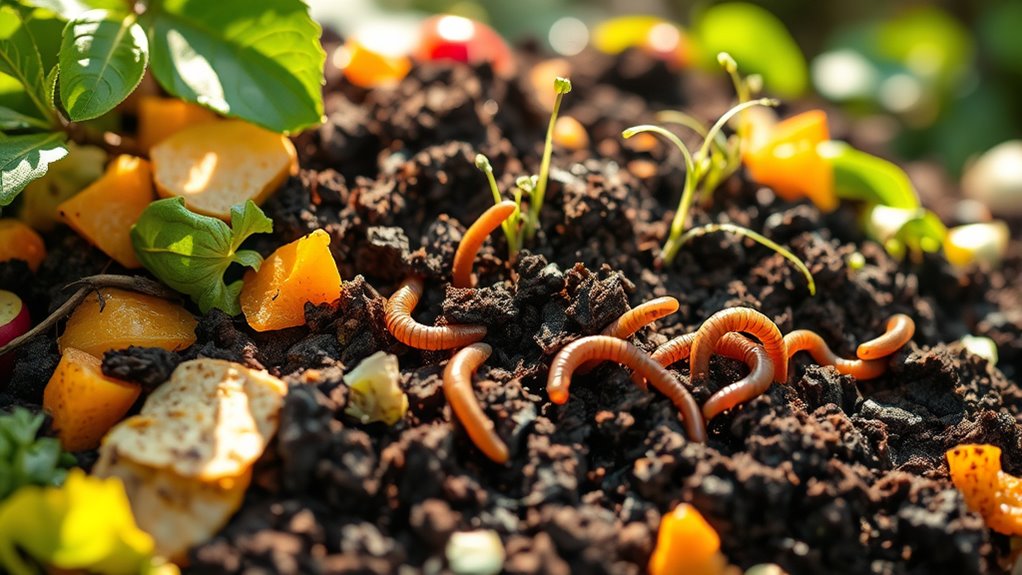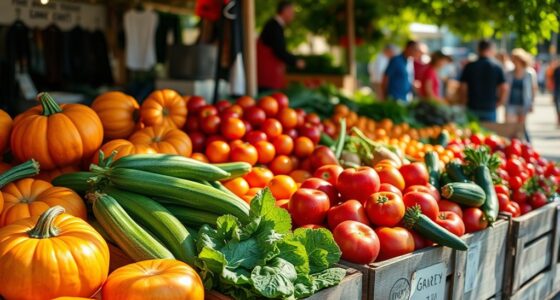Composting is your key to turning kitchen scraps into garden gold! By using items like fruit peels, coffee grounds, and vegetable trimmings, you can create rich, nutrient-packed compost that transforms your soil. This eco-friendly practice reduces landfill waste, fights climate change, and boosts your garden’s health. Plus, it promotes biodiversity and water retention. Want to learn the best methods and tips to make your composting journey successful? There’s so much more to discover!
Key Takeaways
- Composting reduces landfill waste and combats climate change by recycling organic kitchen scraps into nutrient-rich soil amendments.
- Suitable kitchen scraps include fruit and vegetable peels, coffee grounds, and cooked grains, while avoiding citrus, meat, and dairy.
- Choose a sunny spot for your compost bin, ensuring it is at least 3 feet wide for proper aeration and drainage.
- Maintain moisture levels and regularly turn the compost pile to enhance decomposition and prevent foul odors.
- Mix compost with potting soil in a 20/80 ratio to boost fertility and promote healthy plant growth in your garden.
The Benefits of Composting for Your Garden and the Environment
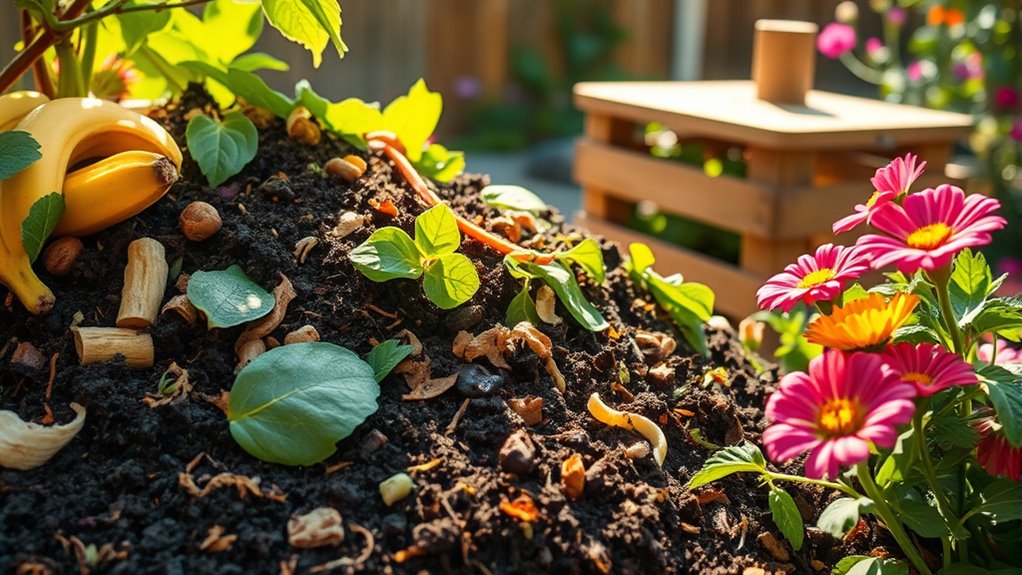
Composting isn’t just a gardening trend; it’s a powerful way to enhance both your garden and the environment. By recycling organic materials, you reduce landfill waste and help combat climate change by cutting greenhouse gas emissions. Plus, composting supports sustainable living and saves water, as it improves your soil’s moisture retention. Additionally, high-quality compost can provide essential nutrients that promote healthy plant growth. Moreover, composting contributes to biodiversity hotspots by creating rich habitats for various microorganisms and insects. Furthermore, the practice of composting aligns with the principles of emergency preparedness by creating a sustainable cycle of waste management and resource conservation.
Healthy soil leads to thriving plants. Compost enhances soil structure, boosts fertility, and balances pH, creating a better habitat for beneficial microorganisms. Improving soil structure helps plants establish healthier roots and stronger growth, which means less reliance on chemical fertilizers. You’ll also conserve water, as compost helps soil retain moisture and reduces runoff.
Ultimately, composting enriches your garden while positively impacting the planet, making it a win-win for everyone.
What Kitchen Scraps Can You Compost?
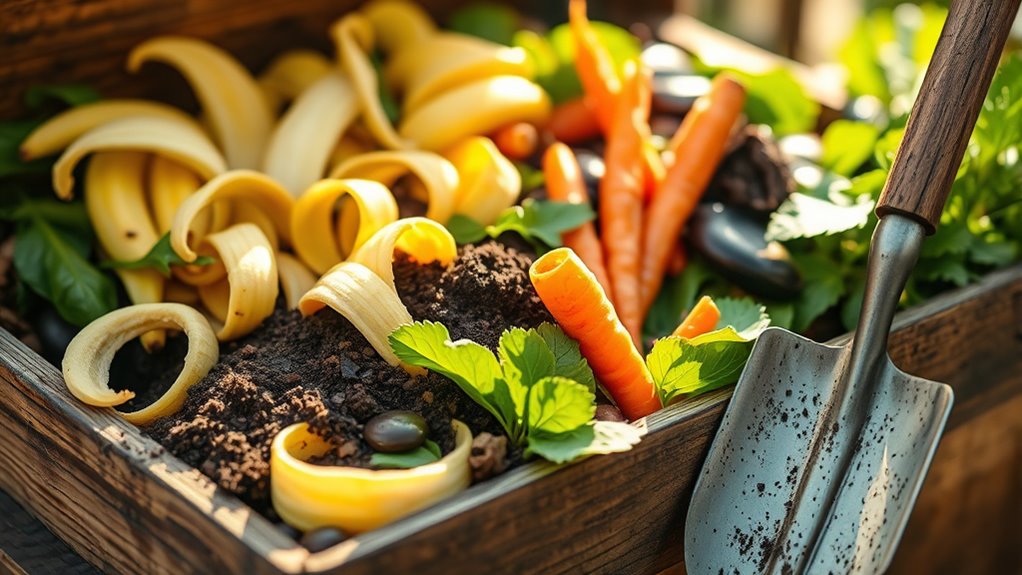
Wondering what kitchen scraps you can toss into your compost bin? You can start with fruit and vegetable scraps, which are rich in nitrogen and essential for decomposition. Composting reduces household waste by 20-50%, making it a fantastic way to minimize your impact on landfills. Additionally, it can also save on assisted living expenses as you create nutrient-rich soil for gardening. Coffee grounds are another great addition, helping to speed up the process. Additionally, incorporating raw food diet principles can inspire you to utilize more scraps in your compost. Did you know that outdoor adventures can benefit from composting as well? Don’t forget about cooked pasta, rice, and even spoiled plant-based milks like soy or almond. Old herbs and spices contribute valuable nutrients too.
For brown materials, consider crushed eggshells, coffee filters, stale bread, and used paper napkins. You can also add small amounts of spoiled jams, stale beer, or old oatmeal. Just steer clear of citrus peels, onions, meat, and dairy, as they can disrupt your compost’s balance. Happy composting!
Different Composting Methods: Find What Works for You
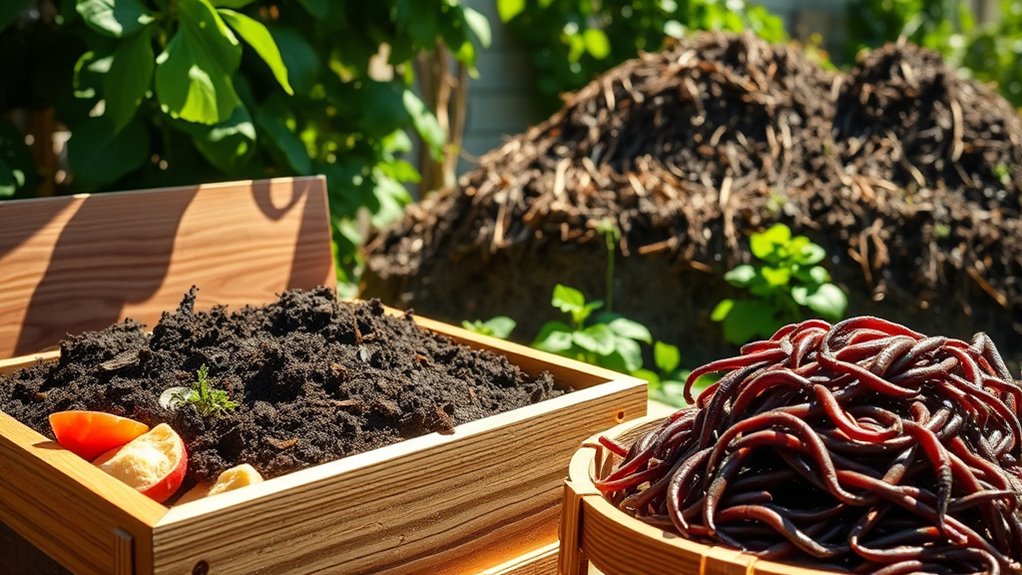
When it comes to composting, choosing the right method can make all the difference in your success and enjoyment.
You can explore several options based on your space and needs. Open air composting is perfect for backyard piles, combining green and brown materials. Additionally, onsite composting is the cheapest and easiest method for beginners. Imagination plays a key role in transformative possibilities as you experiment with different composting techniques. If you prefer burying scraps, direct composting is an effective, low-maintenance choice. For quicker results, try tumbler composting, which aerates your materials as you rotate the bin. Using self-watering planters can also help ensure that your composting efforts benefit your garden effectively, as they maintain ideal moisture levels for optimal plant growth.
Explore various composting methods tailored to your space, from open air backyard piles to convenient indoor solutions.
If you’re short on space, vermicomposting with worms can thrive indoors. For a more advanced approach, consider EMO composting, which uses beneficial microorganisms. Each method has its perks, so experiment to discover what suits your lifestyle best!
How to Set Up Your Compost Bin Effectively
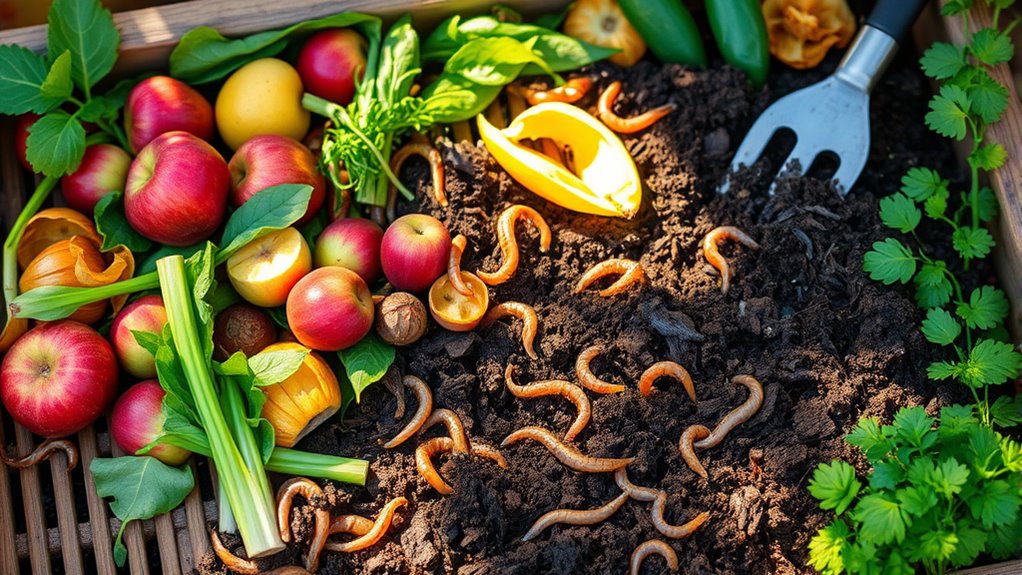
Setting up your compost bin effectively involves a few key steps that can enhance your composting experience.
First, choose a sunny spot with easy access near your kitchen, ideally on bare soil for drainage. Consider using a bin that’s at least 3 feet wide, ensuring it allows for aeration and drainage while keeping pests out. Proper aeration is crucial for effective composting, so make sure your bin design allows air circulation. Additionally, it’s important to monitor the moisture levels to ensure the compost breaks down efficiently. Understanding system vulnerabilities can help you avoid composting mistakes that may lead to odors or pests. Regularly turning the compost can also enhance oxygen flow, further speeding up the decomposition process.
Start with a base layer of twigs or mulch to promote airflow. Alternate layers of green materials like kitchen scraps with brown materials such as dry leaves, aiming for a 2:1 ratio.
Add water as needed to keep it moist, then top it with soil or finished compost to minimize odors. With these steps, you’ll be on your way to successful composting!
Tips for Maintaining Your Compost Pile
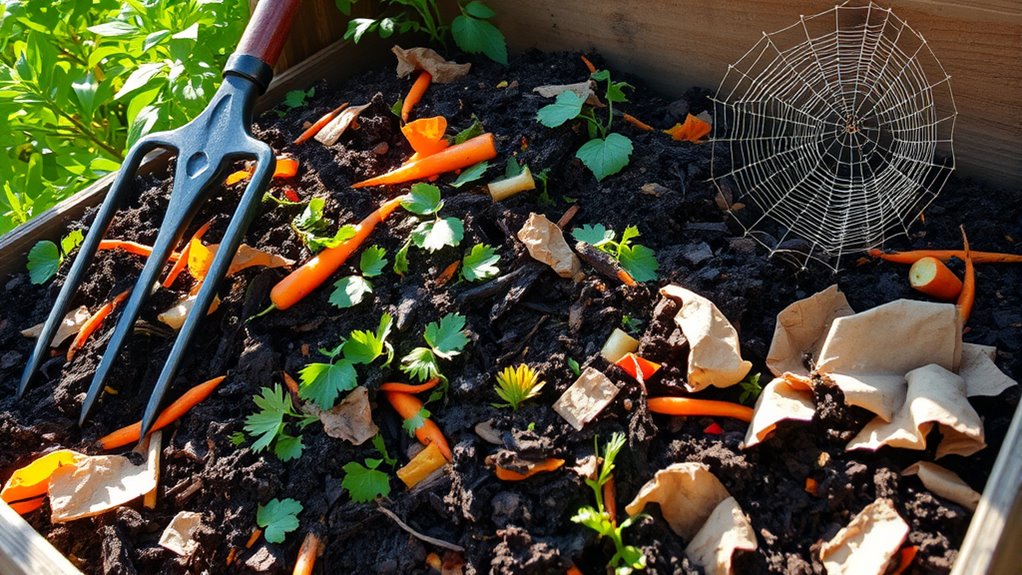
After you’ve set up your compost bin, maintaining your compost pile is key to achieving rich, nutrient-dense compost.
First, monitor moisture levels; your compost should feel like a wrung-out sponge. Check by squeezing a handful—it should yield a drop or two. If it’s too dry, water it gently, but avoid overwatering, which can leach nutrients. Adding fresh orange juice to your compost can help balance acidity and provide beneficial nutrients. Additionally, consider incorporating browns and greens to optimize nutrient content and maintain a balanced compost mix. Regularly adding organic materials can also enhance the microbial diversity necessary for decomposition.
Monitor moisture levels in your compost; it should feel like a wrung-out sponge for optimal results.
Next, guarantee proper air circulation by turning the pile regularly, using aeration tools or rebar to introduce air. This enhances microbial activity, which is essential for effective decomposition.
Keep an eye on temperature; aim for 130°F to 160°F to kill pathogens.
Finally, address common issues like foul odors by adding browns and turning the pile.
The Environmental Impact of Composting

Composting not only enriches your garden but also plays an essential role in mitigating environmental issues. By diverting organic waste from landfills, you greatly reduce methane emissions, which have a high global warming potential. This simple act can cut U.S. carbon emissions by up to 2.5% if all solid waste is composted. Plus, composting improves soil health, retaining water and preventing erosion, which enhances downstream water quality. It also minimizes air pollution from incineration, lowering the risk of respiratory illnesses. Additionally, the practice of composting is a sustainable method that aligns with the principles of environmental sustainability, contributing to a healthier planet. Renewable energy technologies can also benefit from composting by reducing the demand for chemical fertilizers. Furthermore, composting practices support organic gardening practices that promote biodiversity and soil health. By engaging in composting, you’re not just benefiting your garden; you’re contributing to a more sustainable future, creating economic opportunities, and supporting community initiatives that promote composting practices and recycling.
Transforming Your Garden With Nutrient-Rich Compost

When you enrich your garden with nutrient-rich compost, you’re not just enhancing the soil; you’re creating a thriving ecosystem for your plants. Compost provides essential nutrients like nitrogen, phosphorus, and potassium, releasing them slowly to nourish your plants over time. By improving soil structure, it enhances water retention and drainage, supporting robust root systems. Worm castings provide a concentrated source of nutrients and beneficial microorganisms that further boost soil health. Additionally, maintaining consistent routines in composting practices can help ensure that the composting process remains efficient and effective. You can apply compost as a soil amendment, mulch, or even in compost tea for added benefits. Mixing compost with potting soil in a 20/80 ratio boosts fertility and reduces the need for chemical fertilizers. This natural approach not only promotes healthier plant growth and increased yields but also contributes to a more sustainable garden environment, turning your kitchen scraps into garden gold. Incorporating fermented vegetables into your diet can also enhance soil health by enriching compost with beneficial microbes.
Frequently Asked Questions
Can I Compost Meat and Dairy Products?
You might think about composting meat and dairy, but it can be tricky.
These products attract pests and create strong odors, making your compost pile less pleasant. If you really want to compost them, consider specialized methods like bokashi or hot composting that can handle the challenges.
Otherwise, it’s safer to use community drop-off programs or biodigesters to manage those scraps sustainably without compromising your composting efforts.
How Long Does It Take for Compost to Be Ready?
Composting can create an engaging concoction of nutrients, but how long does it take? Typically, it takes anywhere from a few weeks to a year for your compost to be ready.
Factors like material size, climate, and moisture levels play essential roles in this timeframe.
Keep your pile balanced with carbon and nitrogen, and you’ll notice your compost shrinking, darkening, and transforming into a crumbly, earthy treasure that enriches your garden.
What Should I Do if My Compost Smells Bad?
If your compost smells bad, don’t worry; you can fix it!
Start by adding brown materials like leaves or shredded paper to balance the nitrogen. Turn the pile regularly to aerate it and promote aerobic bacteria.
Check for excess moisture and add dry materials if it’s too wet. Mix your compost well to avoid layering.
Finally, monitor the carbon-nitrogen ratio to keep odors at bay and guarantee healthy decomposition.
Can I Compost Citrus Peels and Onions?
You might wonder if tossing citrus peels and onions into your compost pile will create a vibrant ecosystem.
While you can compost both, be cautious. Their acidity can harm beneficial microorganisms and worms.
If you decide to go ahead, cut them into smaller pieces and add them in moderation. Bury them deep in the pile to deter pests, and keep an eye on your compost’s health for best results.
Happy composting!
How Often Should I Turn My Compost Pile?
You should turn your compost pile every three to four days for ideal decomposition.
This keeps oxygen flowing, promotes even heat distribution, and prevents unpleasant odors.
However, adjust your turning frequency based on your pile’s size, moisture, and the balance of materials.
If conditions are right, you mightn’t need to turn it as often.
Conclusion
By composting your kitchen scraps, you’re not just reducing waste; you’re enriching your garden and helping the environment. Imagine transforming those leftovers into nutrient-rich soil that nurtures your plants and supports local ecosystems. Isn’t it incredible how something as simple as composting can make such a big difference? So, grab those scraps and start your composting journey today—your garden will thank you, and you’ll feel great knowing you’re contributing to a healthier planet!
